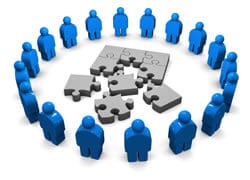
Developing Leaders
Courses in organizational development at the master’s level explore relationships in a business culture that involve individuals, groups and organizations. Scientific approaches to observing individual behavior and interpersonal relationships help graduates understand how they affect an organization’s structure. Students learn to apply strategic visioning methods that help corporations identify and capitalize on leadership qualities. Consultation skills are explored so that graduates can have maximum impact on creating a productive corporate environment. Professionals and executives can find ways to lead a corporation to higher levels of productivity by studying the concepts of organizational development.
Adapting to Change
Studying the forces that affect change helps students learn how to encourage the process and to counteract resistance to it. Understanding the impact of change on employees who are affected by it can facilitate a transition from existing behaviors into new and more effective practices. Change is often met by denial, anger and dejection prior to acceptance. Students who study organizational development at the master’s level learn to cope with the forces that resist change and to assist employees in adjusting to an evolving work environment.
Understanding Motivation
Employees are motivated by forces that exist within an organization and by those in society. A Master’s in Organizational Development teaches students to scientifically observe the ways in which attitudes and beliefs affect decision making. Creating a productive and creative environment in the work place helps employees understand their influence in shaping the profile of a company. Corporations value employees as vital assets, and encouraging achievement and growth is an investment that pays dividends in productivity and job satisfaction. A corporation’s commitment to enriching the lives of dedicated employees through motivation allows a person who has a Master’s in Organizational Development to help implement corporate goals.
Learning Negotiation Skills with a Master’s in Organizational Development
Developing skills in negotiation can make high stakes more manageable and reduce the stress that occurs in person to person interactions. Employees who have different points of view can benefit from the guidance of a person who is training in negotiations and has strong people skills in general. A Master’s in Organizational Development presents students with opportunities to experience mock situations that require realistic participation. Organizations can achieve better outcomes by promoting business relationships that are respectful and productive.
Organizational development is a behavioral science that works with the strengths and weaknesses of human interactions to improve performance in a complex business culture. Study in the science trains students to develop employee leadership skills and to implement motivational practices. Facilitating the acceptance of change and recommending effective negotiating strategies are techniques that reduce employee stress levels and improve productivity. A Master’s in Organizational Development benefits graduates by offering scientific methods that work well in the management of human resources.
Related Resource: Is an HR Degree Worth It?